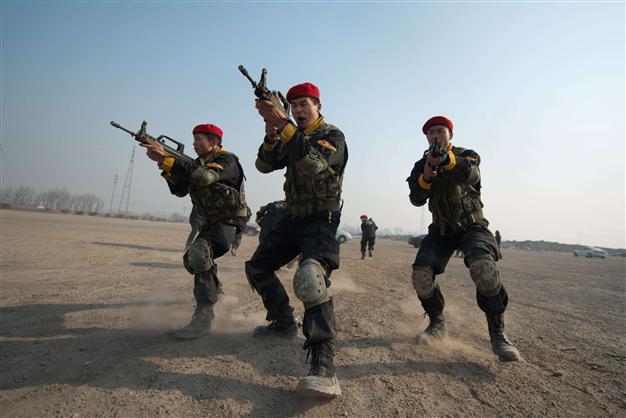China's military at 'high risk' on corruption: watchdog
TAIPEI - Agence France-Presse

Trainee bodyguards of the Genghis Security Academy conduct an ambush exercise at a training ground on the outskirts of Beijing on January 18, 2013. AFP photo
China's armed forces are battling a major corruption problem, with little political oversight and no whistleblower mechanism to counter graft, watchdog Transparency International said Tuesday.China, which has the world's largest active military, scored as a "high-risk" country on a new global index on defence establishment corruption launched by the Berlin-based organisation at a press conference in Taiwan.
"The Chinese military acknowledges that there is a major corruption issue through its various promulgations, and it has put a variety of measures in place to limit this major concern," said Mark Pyman, director of the organisation's Defense and Security Programme.
However, he said a lack of transparency means it is uncertain how effective these measures are, as the military does not allow the level of scrutiny required to ensure an anti-graft campaign is succeeding.
"There are many areas where China is weak in its protections against corruption in its defence sector, and it has very low oversight of defence and armed forces policy and no effective whistleblower system," Pyman said.
One of the major problems in China is the absence of private military defence contractors, meaning less scope for competition, Transparency International said in a report accompanying the index.
Pyman said the armed forces' corruption problem was also manifested in the thousands of military-linked enterprises engaged in profit-oriented business.
"What is positive is that the Chinese military has been taking corruption seriously," said Pyman.
"For example, they have been making big efforts to close down or transfer the ownership of these enterprises." The organisation also said in its report that the centralised structure of the Chinese state apparatus made the defence sector more prone to corruption.
"Highly centralised structures ensure a wealth of regulation in the defence sector, but the concentration of power itself creates a corruption risk," the report said.
The new index issued by Transparency International covered a total of 82 countries, looking at the strength of anti-corruption measures in place.
Australia and Germany were ranked top on the index, while the bottom was made up of a number of mostly African countries, including Angola, Cameroon and Egypt.
The People's Liberation Army, which includes the air force and navy, has 2.3 million personnel. Its officially declared defence spending rose 11.2 percent to 670 billion yuan ($108 billion) in 2012.
















